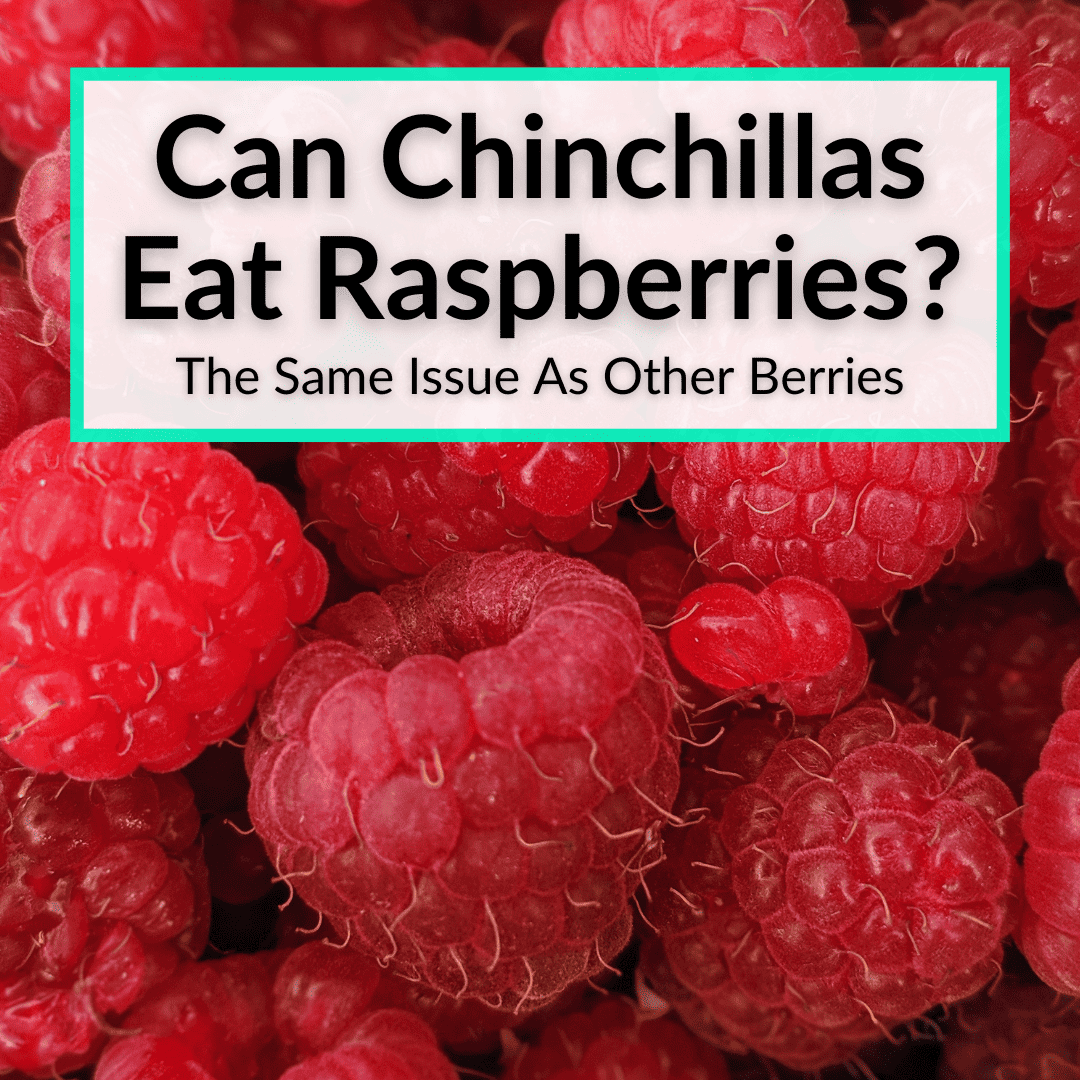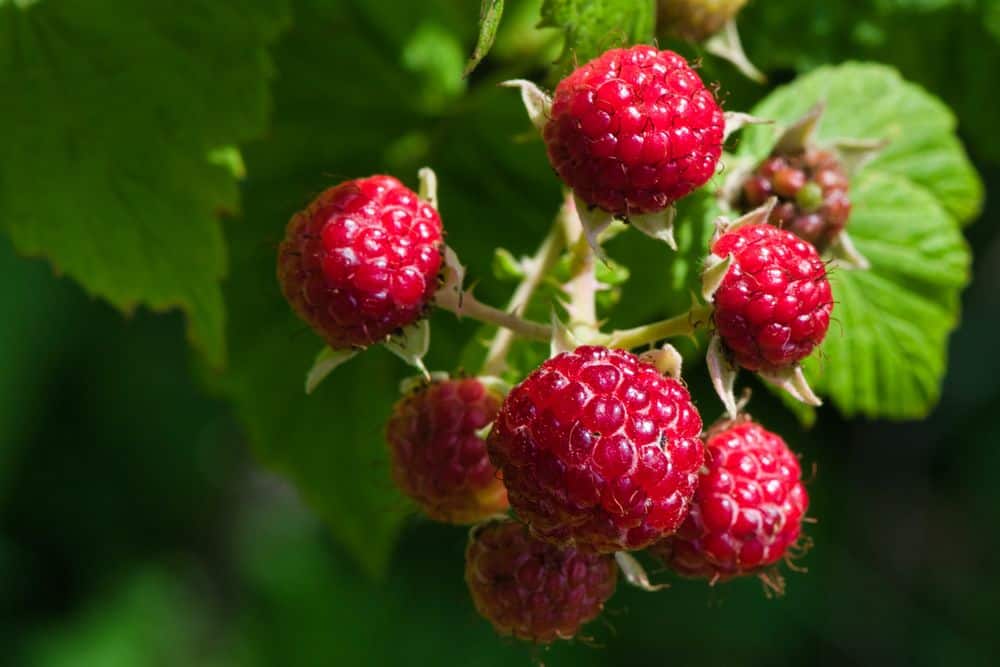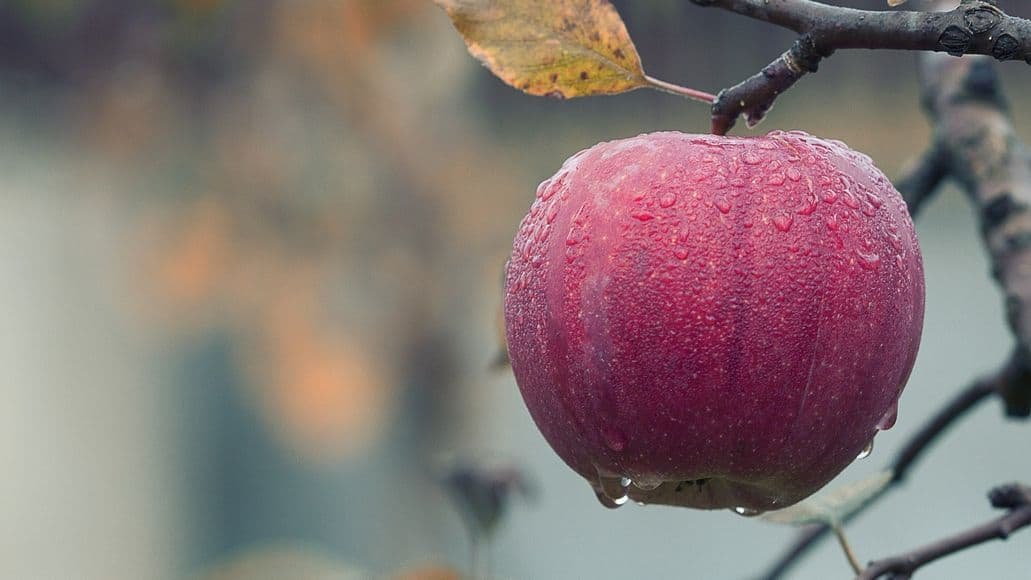
They are chock full of vitamins and antioxidants.
But they also contain a lot of water and sugar?
Why do I mention those two?
Because both can cause problems for a chinchilla’s sensitive digestive system.
How much of a problem? Can chinchillas eat raspberries at all, or is it best to keep this berry far away from your pet?
Keep reading to find out. We will cover everything you need to know about feeding a chinchilla raspberries, including what amount is safe, if any.
Contents
Can Chinchillas Eat Raspberries?
Yes, chinchillas can eat raspberries, but it is not a good idea. This fruit contains a lot of sugar and water. Both present problems for a chinchilla’s digestive system. If you do feed your pet raspberries, make sure it’s a very small amount.
How small? If you feed a piece of raspberry the size of a fingernail once or twice a week, you should be fine. Avoid giving more than that. Let’s go int a little more detail on why raspberries can present a problem for your chinchilla.
Why Raspberries Are Problematic For Chinchillas

Feeding your chinchillas raspberries in large amounts can cause a lot of issues. The sugar and water content of raspberries is far too high for a chinchilla’s digestive system to handle. And with an animal this small, ‘large amounts’ is not very large at all.
Feeding a chinchilla too much sugar can result in digestive issues such as bloating, diarrhea, sickness and stomach pain. Chinchillas have a sensitive digestive system and they can struggle to digest high amounts of sugar.
If your chinchilla starts to suffer from any of these symptoms after eating too much sugar, you should take it to the vet as soon as possible. It can quickly turn into a serious, and even life-threatening, issue.
High amounts of water can also be dangerous for your chinchilla. This species is native to the arid Andes mountains, where water is scarce. As a result, they have adapted to surviving on very little water, by being able to retain it for much longer than other animals.
This is why their pee comes out so concentrated, in case you were wondering about that. And if a chinchilla consumes too much water, its body doesn’t know what to do with it.
It holds on to the water as it is used to doing, but with too much water being retained, your chinchilla may suffer from stomach pains and bloating. And chinchilla bloat can quickly become serious. Even deadly.
Raspberries are also high in fiber. Fiber is something chinchillas need, but too much of it can also cause problems like gastrointestinal and digestive issues. And they already get a lot of fiber from their regular diet of Timothy hay and pellets.
Can I Feed Other Berries To My Chinchilla?

I would recommend keeping all types of berries away from your chinchilla. This includes cranberries, blackberries, strawberries and blueberries. None are toxic to chinchillas, but all are high in sugar and water and will have the same effect on your chinchilla as raspberries.
That means you need to limit the amount of raspberry, or any other berry, you feed, if you do decide to give your pet some. Or you can feed your chinchilla dried berries.
Dried fruit obviously eliminates the issue with water, since dried fruits contain very little moisture. The lack of water makes it a healthier option for chinchillas.
Of course, you need to remember that dried fruit still contains a high amount of sugar. That means you still need to limit how much of the fruit you feed. You can give your pet slightly more, but I’d stick to the same amount given above. Any fruit should only ever be an occasional treat.
What Berries Can Chinchillas Eat?
The only type of berry I recommend feeding your chinchilla are goji berries. You can feed your chinchilla goji berries because they are lower in sugar than other berries. This means they won’t cause as much harm to your chinchilla’s digestive system.
If you buy dried goji berries for your chinchilla, that makes them an even better snack, since dried ones are low in water. You can feed your chinchilla two dried goji berries per week. You can keep them as a treat to reward your chinchilla for any good behaviour.
What Fruits Can I Feed My Chinchilla?
There is no fruit that you can feed to a chinchilla in large amounts, but there are some fruits that are a bit better than berries. And with all fruits, the dried versions are better, since they contain less water. But all fruits are high in sugar.
As long as you remove the core and seeds, you can feed your chinchilla apple. It will love the sweet taste of an apple and the tough crunchiness will help your chinchilla grind down its teeth. Of course, apples do contain a lot of water and sugar.

You can feed your chinchilla banana in small amounts, too. The fruit is high in potassium, which is very beneficial for your chinchilla. However, bananas are also high in sugar, so stick to small, fingernail-sized amounts once or twice a week here too.
Can Chinchillas Have Raspberries: Final Thoughts
Chinchillas can eat raspberries, but just like all other berries, they should only have a small amount and only once or twice a week. The reason for this is the high sugar and water content.
Raspberries, and any other fruit, are better for chinchillas when they are dried, since that eliminates the water issue. But dried fruit still contains sugar. In fact, it contains more per weight, since removing the water content makes everything else ore concentrated. That means even dried fruit can only be fed in small amounts.
Leave a Reply